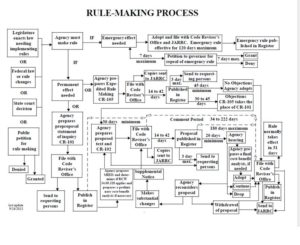by Crystal Oliver, President, Co-Founder, Washington’s Finest Cannabis; Executive Board Member, Cannabis Farmers Council; Executive Assistant, Washington State Affiliate for NORML (National Organization for the Reform of Marijuana Laws)
[reprinted with permission from the author, from November 5, 2017 — DC]
Five years ago when my husband and I attended the New Approach Washington Initiative 502 election night celebration we had no idea that we would be spending the next few years engaging with so many different regulatory agencies, we were still undecided about whether or not we would enter the market.
I remember the hearing the WSLCB held in Spokane, there were several hundred in attendance. My husband, Kevin Oliver‘s testimony recommended the board adopt regulations that allowed small businesses to thrive and also encouraged the board to allow those with past drug convictions an opportunity to participate in the newly legal market.
When the WSLCB released their first set of draft regulations I pored over the hundreds of pages. The board had indeed put together regulations that included provisions to protect small business including caps on the number of retail stores and farms a person could own as well as caps on the size of individual and state canopy. We ran some projections and decided that we were in a position to start our business and take our advocacy to the next level. We were confident that we could support implementation and demonstrate that legalization was preferable to prohibition.
Just two months after our initial screening interview with the WSLCB, after we had submitted hundreds of pages of documents including our banking records & fingerprints (which we had taken at the public safety building by an active law enforcement officer). Our local county commissioners adopted an emergency zoning ordinance that rendered 97% of our parcel unusable for growing or processing marijuana. This would be our first introduction to the world of land use policy and the Washington State Rule Making process.
We were eventually successful in organizing and mobilizing the local would-be legal marijuana farmers to oppose the ordinance and a new less restrictive ordinance was adopted and we along with our fellow farmers were able to move forward.
Next came a proposal from the Washington Association of Building Officials (WABO) to modify the state building code to add Marijuana growing and processing to the list of “moderate factory industrial uses” which would have triggered F1 building code requirements for all structures where cannabis was grown. Fire flow requirements alone would have devastated rural cannabis farmers throughout the state. Again, we organized and mobilized the farmers and saw the proposed rule modified and marijuana growing was stricken from the rule proposal. I would later serve on the Cannabis TAG for the SBCC as they clarified and modified the fire code for marijuana extraction.
Meanwhile, the WSLCB continued to adopt emergency rule after emergency rule. There were months where multiple rule changes were adopted impacting our businesses processes, too many to list here. A couple over-reaching proposals that come to mind were the WSLCB proposed rule to add destruction of inventory as a mandatory penalty for farmers violating minor regulations and the proposed requirement of commercial grade fencing. In both these instances we had to organize and mobilize and push back and we won.
There have also been battles with the legislature including preventing cannabis farmers from taking agricultural tax exemptions, allowing out of state financing and increasing our license fees which the farmers have lost.
Recently the WSLCB awarded the traceability contract to Franwell, aka METRC, an RFID company, and we mobilized farmers to oppose the requirement of these expensive, single use hard plastic tags for tracking or security. The WSLCB agreed that the vendor could not require this and then METRC pulled out of the contract.
Now our farm is facing increased fees from the county and the local clean air agency. The Clean Air Agency hearing is actually the day after the 5 year anniversary of when legal pot went into effect in Washington.
It’s too bad the farmers can’t celebrate; instead they’re fighting government overreach. It’s no wonder there is so much income inequality in the US when various government agencies are always trying to take a piece of the revenue from small business owners while offering tax breaks and other incentives to large businesses.
I am proud of the work that we’ve done as a group but I fear for the future viability of small, family run cannabis farms in this state. Over-regulation and over-taxation is strangling them.
